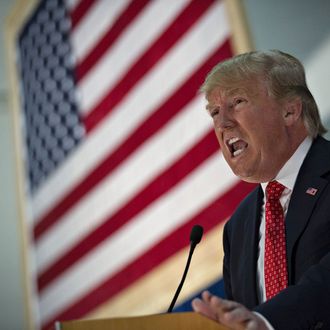
Donald Trump got barbecued at the last candidate debate for not having a detailed health-care plan with which to replace Obamacare, and he’s still getting hit for comments earlier in his career as a policy wonk (joke!) praising single-payer plans in general and the Canadian single-payer system in particular. So it’s no surprise he’s now released a branded “health plan.” What is surprising is how banal it is, embracing the worst versions of some of the worst features of standard GOP health-care proposals dating back for many years. It would, if implemented, not even fulfill Trump’s oft-stated demand, sadly provocative in today’s Republican environment, to make sure “people don’t die on the streets.”
The centerpiece of the Trump plan is the most conventional conservative health-policy pet rock of them all: interstate insurance sales. Trump had hinted earlier that he might insist on complementing a virtual elimination of state health-insurance regulation with a federal regulation banning discrimination against people with preexisting health conditions, a key accomplishment of Obamacare and a popular one at that. There’s no hint of that here, which means insurance companies will stampede to locate themselves in states that let them discriminate to their hearts’ content. There’s not even a lousy high-risk pool (a standard feature of most other GOP plans) to give sick people the theoretical options of bad insurance at crazy-expensive rates.
The only purchasing incentives in the plan are tax benefits to encourage use of another conservative health-policy pet rock, health savings accounts, designed to take us back to the 1950s when most people paid for health care out of pocket; and a tax deduction for individual insurance premiums. Tax deductions, of course, are worthless to most poor people and most valuable to the rich, which is why most Republican plans deploy a credit rather than a deduction.
And what about the very poor, those most likely to “die on the streets”? Trump embraces a third terrible conservative idea, turning the health-care safety net Medicaid program into a block grant, a 180-degree turn from the Medicaid expansion Obamacare provided for and a likely disaster in red states with large populations of poor people who don’t vote Republican.
Yes, there’s vague language in the plan suggesting “we must review basic options for Medicaid and work with states to ensure that those who want healthcare coverage can have it.” What that means in the context of a block grant is anybody’s guess.
And yes, Trump reiterates his support for drug importation and other measures to pressure pharmaceutical companies to lower prices. That doesn’t do much for people who cannot access them even at a reduced price.
Those who believe Donald Trump is some sort of closet liberal that Bernie Sanders supporters might embrace in a general election need to take a close look at Trump’s “thinking” on health care. It’s not easy to make Ted Cruz and Marco Rubio look relatively progressive in any policy area, but this timid and reactionary plan to go back to the pre-Obamacare status quo ante and make it worse might accomplish just that.






























